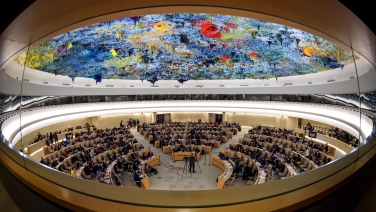
The Human Rights Institute (HRI) partners with leading Yemeni human rights advocates to seek accountability for human rights abuses committed by all parties to the conflict in Yemen. Our work includes a targeted collaboration with public health experts to investigate the conflict’s impact on mental health and strengthen mental-health policies and services.
Multiple armed conflicts have raged in Yemen for at least a decade. In 2014, a Houthi armed group took control of Sana’a by force, and in 2015, an international coalition of states led by Saudi Arabia and the United Arab Emirates, supporting the internationally recognized Yemeni government, intervened and escalated the conflict.
The United States, Saudi Arabia, and the United Arab Emirates, among other states, are responsible for unlawful use of force in Yemen. Non-state actors have launched attacks, detained journalists and religious minorities, and impeded humanitarian access, contributing to what the UN describes as “the world’s worst humanitarian crisis.” The United States has supported allies that commit human rights violations by providing weapons and training, refueling fighter jets, and sharing intelligence.
The ongoing conflict impacts every aspect of life in Yemen. Citizens suffer widespread hunger and malnutrition and remain on the verge of famine, and they face multiple outbreaks of preventable and treatable diseases. Yemenis are exposed to violence and trauma daily. Despite the potential for severe impact on public mental health, no one has addressed the psychological effects of the war. This neglect of the collective well-being threatens long-term harm for generations of Yemenis, and could well undermine post-conflict recovery.
Since 2017, the Human Rights Clinic and HRI have partnered with Yemeni human rights organization Mwatana for Human Rights (Mwatana) to pursue international accountability for abuses carried out in connection with the conflict, to expose U.S. counterterrorism operations in Yemen, and to end the war in the region. Our work has supported Mwatana’s capacity to undertake UN advocacy, and included direct advocacy with the UN Human Rights Council to shape reviews of the human rights record of both Yemen and Saudi Arabia.
HRI also works closely with the Sana’a Center for Strategic Studies and the Mailman School of Public Health to conduct interdisciplinary research into mental health in Yemen and advocate for evidence-based improvements. We published the first international policy analysis of mental health policies and services in Yemen, and our global advocacy has increased global attention on these issues. To deepen this work, we were awarded a Columbia President’s Global Innovation Fund grant.














